Venezuela Cannot Fix Itself Alone
 Jeso Carneiro / Flickr / CC BY-NC 2.0
Jeso Carneiro / Flickr / CC BY-NC 2.0
The Venezuelan government and its bitter antagonist, the opposition parties who now control parliament, have finally agreed to initiate a dialogue to find solutions for the country’s confrontational politics and economic desperation. A serious dialogue may be the only path to a peaceful settlement. The only obvious alternative is a military takeover—which could, more benignly, result in new elections and a quick return to civilian rule or, more ominously, in the armed forces governing for an extended period.
No one can be confident that the proposed dialogue, conducted under the auspices of the Union of South American Nations (UNASUR), will succeed. The two sides are miles apart in their diagnoses of Venezuela’s problems and what to do about them. Each blames the other for triggering the crisis and thwarting its resolution. Neither seems ready, even minimally, to cooperate with the other.
Aside from their vague support of the dialogue, Western Hemisphere governments have mostly chosen to stay out of the potentially explosive conflict. (Only one regional leader has seriously engaged the crisis—OAS Secretary General Luis Almagro, who has censured the government’s constitutional violations and pressed for outside intervention.) Whether the negotiations succeed depends mostly on the Venezuelans, but the active engagement of other nations would raise the chances of a favorable outcome.
US policy could have particularly far reaching consequences. Although its influence has diminished, the US still exercises considerable weight in regional affairs. But the US confronts a politically fraught set of choices when it comes to Venezuela—and has had trouble in finding the right balance.
There are pressures at home for the US to take a harder line toward the Venezuelan government’s repressive, authoritarian rule. But most Latin American nations strongly oppose even the mild US sanctions imposed so far. Additional sanctions could disrupt the currently fragile basis for dialogue and would further diminish prospects for US-Latin American cooperation. And the already distressed Venezuelan population could be hurt. But US diplomatic measures, led by senior envoy Tom Shannon, have not achieved much either. Relations with Venezuela remain adversarial and tense.
Where the US does have sway is with the opponents of the Maduro regime, and it should continue to back their efforts to restore democratic practice and the rule of law to Venezuela. But Washington should also encourage the opposition to pursue measured, realistic goals in its forthcoming dialogue with the government. Venezuela’s economic hardships and its food and medicine shortages are already a humanitarian emergency, and might be the right place to start negotiations. Discussion of sensitive political issues might be better postponed until the talks show some progress. This will not, however, be easy for most opposition groups to accept. Most are sticking to their demand for a presidential recall vote this year, which the government adamantly rejects as it could result in the end of Chavista rule.
While US cannot determine the opposition’s negotiating stance, it can be a moderating and unifying influence. China and Cuba could well have a similar influence on the posture of the Maduro government. China, after all, is Venezuela’s leading source of external financing, at a time the country is seeking to avoid default. Its advice on economic matters has to be taken seriously in Caracas.
Although weakened by Hugo Chavez’s death and Cuba’s reconciliation with the US, Venezuela and Cuba have been allies since Chavez election in 1998. Partly in exchange for thousands of teachers, medical personnel, and security advisors, Venezuela, over many years, provided Cuba with support valued at around $5 billion a year—but the amounts are declining and the island’s economy is suffering. Cuban officials remain in close consultation with the Venezuela highest authorities. What advice they are providing has not been revealed.
Once a reliable supporter of Venezuela, Brazil, facing its own political and economic reversals, has now lost most of its influence in the country—along with its leadership in regional politics. As such, Brazil cannot be expected to play a consequential role in Venezuela for some time. And no other Latin American country is capable of mobilizing a collective regional effort to assist the Bolivarian Republic.
Venezuela’s prolonged crisis is a test for the US and Latin America. So far regional cooperation has failed. Venezuela is still on its own and rapidly crumbling.
Read original Portuguese article here.



















